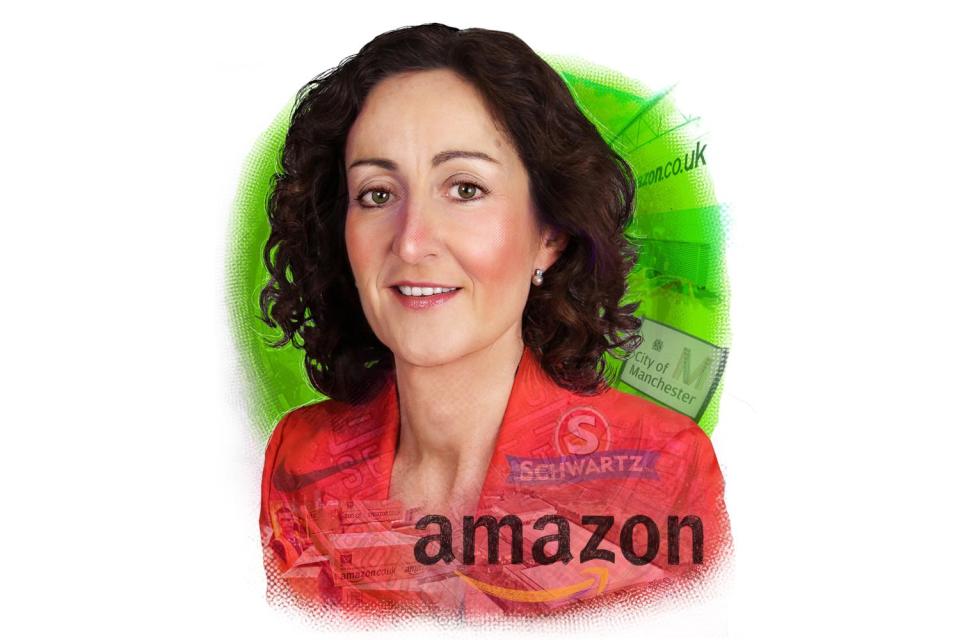Black Friday: Meet Amazon’s Fiona McDonnell - the boss trying to break up tech’s ‘bro culture’

Fiona McDonnell has an unusually keen interest in manhole covers. Specifically the underside of them. As a trainee in the construction industry, McDonnell, now an executive in the upper echelons of online giant Amazon, began her working life analysing Manchester’s sewers.
She was the first person to brave some of the tunnels since the 1930s: “I’d always wanted to go underneath the manhole covers. It’s like an artwork down there… I got pulled out by some larger builders right next to a bus stop full of people, some of whom I knew,” she laughs.
Looking at her career three decades on, the anecdote seems fitting; she’s always waded into industries dominated by men, unconcerned by her appearance.
These days, she spends her days in the calmer environs of Amazon’s imposing headquarters on the edge of Shoreditch.
McDonnell joined the £877 billion tech giant in 2015 to run its toys arm, and rapidly scaled the ranks. She is now right-hand woman to UK chief Doug Gurr. Her role as consumer retail director puts her in charge of the millions of products on the European sites, and she also handles a group diversity drive.
Her remit encompasses everything a consumer might encounter, although not its engine-room cloud-computing business or streaming arms. Her days are spent meeting suppliers, staff and customers, analysing data obsessively and visiting Amazon’s gargantuan warehouses across Europe.
We meet as today’s Black Friday shopping bonanza nears. Opinions are still split among UK retailers on its merits. Initially brought over the Pond by US-owned Amazon and Asda, the pre-Christmas spree is established and has spread well beyond a single day. McDonnell says she takes a hands-on approach, and any employee can flag up mistakes on product listings published in the frenzy. “We plan rigorously for it. We call out stuff that may or may not work ahead of time so that we can fix things in good time,” she says.
McDonnell, 50, is a Geordie, the granddaughter of a Cumbria shipyard worker and a dinner lady, and grew up sporting a skinhead in Manchester with her teacher parents.
She later studied manufacturing engineering at Cambridge. Her career has since taken in executive roles across the UK, Netherlands, Poland and Germany at Nike, Kraft, Kellogg’s and Schwartz owner McCormick. The polyglot admits a career spent working abroad meant “I’ve lost two of the world’s best accents. Sadly people think I must just be from the Home Counties.”

McDonnell has a unique approach to job selection: “I kid you not, I choose the companies I work for based on what’s in my house, my cupboards or the services I use.”
The one time she ditched this edict, at research firm Forrester, it “just didn’t work for me because it didn’t have that touch and feel of the product”.
Not that her other roles have been straightforward. While at McCormick she had to battle unions in shutting down a Dutch factory, before later taking a job in Poland without ever having been there.
She quickly learnt the language and surprised the locals. “That was the one time where I felt, not less comfortable, but more of a speciality on show being a woman. I gave birth to my second son there and I walked the shop floor right up until a week before he was born with a big belly and, for the large part, my high heels. People found that fascinating... pregnancy was treated like sickness.”
Her family, who live in Hertfordshire, repeatedly crop up in conversation, with wholesome tales of Harry Potter cake-making and Scrabble played in multiple languages. So what does the doting mother make of cheating Amazon founder Jeff Bezos’ divorce? “I don’t focus on those sorts of things, each to their own. Everybody gets one shot at having kids and there’s no manual in how to do stuff.”
Bezos went from selling books in his garage to being the world’s richest man by putting shoppers’ needs first. It’s what McDonnell says attracted her to Amazon: “We start with the customer and work backwards. Our focus on testing fast and being willing to fail is special and not what I was used to.”
Bosses also work differently there, she says. Data is used to make decisions to reduce unconscious bias. Powerpoints are banned, in favour of “written narratives”. Typically meetings begin with everyone reading a document up to six pages for five to 10 minutes in silence. “It may sound strange to some, but it ensures that the discussion is well informed and driven by evidence and data, not personalities.”
McDonnell is unforthcoming on some of the big issues surrounding Amazon. She does dutifully defend its much-criticised tax record and assures customers have control over when its Alexa smartspeaker is listening to them.
But she refuses to reveal plans for areas like its nascent grocery and fashion businesses or acknowledge Amazon’s devastating impact on the High Street. On the latter, she proffers: “We are under 3% of revenues of the market in the UK. It’s not the behemoth everyone says”.
Where she becomes animated is on diversity. Seattle-based Amazon appears to be trying to break down the ‘bro culture’ image of Silicon Valley and hire people from diverse backgrounds to come up with different ideas.
She has been revamping policies on hiring, working on initiatives to get people from underprivileged upbringings into the industry and improve computer science skills in schools.
Will it make a difference in an industry intrinsically linked to nerdy men? “You can be negative and say these are all just too fragmented, nothing will happen but the issues I’m working on could be just that last thing that’s needed to get things moving in a big way. That’s too good not to have a go at.”

 Yahoo Finance
Yahoo Finance 